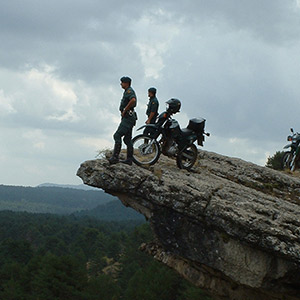CONTRIBUTION
Established in 1988, Seprona is among of the world’s most innovative nature protection services. Its functions range from the enforcement of waste disposal regulations to controlling air and noise pollution, protecting wildlife, with special attention to illegal traffic in protected species, the fishing of immature specimens and the use of poisoned bait, and the safeguarding of historical heritage items located in rural areas.
Over the last two decades, Seprona has been both witness and party to Spaniards’ changing relationship with the natural environment. Each year, its 1,837 agents are responsible for over one hundred thousand interventions (140,234 in 2009 alone).
The service’s present configuration dates from 2000, when a new operations unit was attached to Seprona’s Head Office, with powers to coordinate and build on the actions taken by the decentralized Seprona teams.
At the time of writing, its principal concern is to “advance in excellence” in the words of Lieutenant General Francisco Gabella, Deputy Director-General for Material Resources in the Guardia Civil Directorate of the Ministry of the Interior, and former Seprona commander. To this end, Seprona will be extending its research into forest fires through a new team specializing in major blazes. “We already have trained teams and technology on the ground, but we want to learn from countries with more experience, like the United States and Australia, where large fires are a regular event. Above all, we want to have people working full-time on the problem during the months of the year when there are fewer fires, and it is easy to forget about them,” explained Gabella during the award presentation ceremony.
Seprona also plans to step up policing efforts on other fronts, like the fight against illegal waste transport and uncontrolled dumping, the use of prohibited additives in human and animal food, the laying of poisoned bait, illegal use of phytosanitary products, fish poaching and the smuggling of protected species.
The Service has decided to spend the prize money received on vehicles and equipment: five jeeps, thirteen motorbikes and eleven GPS receivers. The vehicles will be deployed to units throughout Spain, with motorcycles going to Huelva, Málaga, Badajoz, Córdoba, Burgos and Seville and the jeeps joining patrols in Loja (Granada), Viso del Marqués (Ciudad Real), Cortegana (Huelva), Talavera de la Reina (Toledo) and Huesca. These patrols cover areas of great natural value like the Sierra de Aracena y Picos de Aroche nature park, the fluvial stretch of the Genil river, the Ordesa y Monte Perdido national park and other Pyrenean zones.

